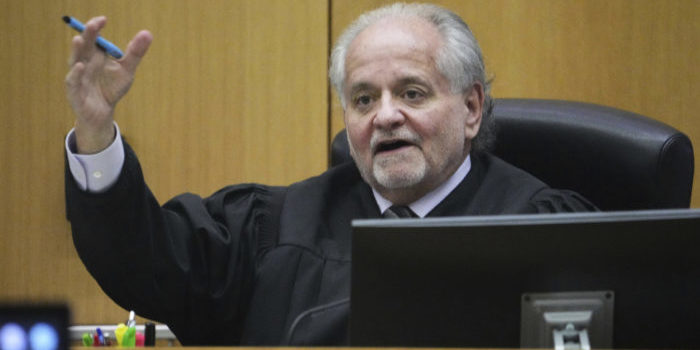(Headline USA) A judge recused himself Tuesday from presiding over Arizona’s lawfare attack on alternate electors in the 2020 election after an email surfaced in which he told fellow judges to speak out against attacks on Democratic Vice President Kamala Harris’s campaign for the presidency.
In the Aug. 29 email, Maricopa County Judge Bruce Cohen lamented that he didn’t speak out when Harris was called a “DEI hire,” invoking the Holocaust to make his point while echoing the dangerous Nazi rhetoric of the Harris campaign.
Cohen didn’t specify who made the comment regarding Harris.
“We cannot allow our colleagues who identify as being a ‘person of color’ to stand alone when there are those [who] may claim that their ascension was an ‘equity hire’ rather than based solely upon exceptionalism,” the judge told his colleagues in the email.
Cohen later wrote another email telling his fellow judges that he let his passion cloud his views and apologized to anyone affected by his lapse in judgment in using an email forum for judges that was not appropriate for unsolicited comments.
Lawyers for Republican state Sen. Jake Hoffman, who faces nine felony charges in the case, sought the judge’s removal, arguing Cohen “bears a deep-seated personal political bias that overcame his professional judgment” and that their client has lost confidence in the judge’s impartiality.
Hoffman is one of 11 Republicans who submitted a document to Congress declaring that then-President Donald Trump won Arizona in the highly disputed 2020 election, which was then being contested in a series of court cases and, ultimately, an audit commissioned by the Arizona senate.
The victims of the lawfare attack, waged by George Soros-backed state Attorney General Kris Mayes, include the former state party chair, a 2022 U.S. Senate candidate and two sitting state lawmakers.
Two former Trump aides and five lawyers connected to Trump, including Rudy Giuliani, also were charged in the case. All 18 people were charged with charged with forgery, fraud and conspiracy.
“Given the statements the judge made, I think it’s appropriate that he recuse himself,” Arizona attorney Mark L. Williams, who is representing Giuliani, said after Cohen’s decision. “The way I see it, the case against Mr. Giuliani and the other defendants is falling apart and I think the attorney general should just wind down the case and dismiss it.”
A spokesperson for Mayes declined to comment on the judge’s recusal.
In a court record, Cohen said the original email was a stand for decency and didn’t reflect a personal bias, but he recognized that others may view it differently than he intended.
Cohen, who was appointed to the bench by Democratic Gov. Janet Napolitano in 2005, was scheduled to retire in January.
Most of the defendants had asked Cohen to throw out the charges under an Arizona law that bars using baseless legal actions in a bid to silence critics.
The law had long offered protections in civil cases but was amended in 2022 by the Republican-led Legislature to cover people facing most criminal charges after Mayes repeatedly sought to settle political scores by targeting Republican rivals.
Alternate electors have been used previously in disputed elections, including the 1960 election between John F. Kennedy and Richard Nixon, in which the votes in Hawaii were not yet finalized as the deadline for certifying the presidential race approached.
Cohen recused himself before deciding whether to dismiss the case, which will be assigned to another judge.
The defendants argued that Mayes tried to use the charges to silence them for their constitutionally protected speech about the 2020 election and actions taken in response to the race’s outcome. They say Mayes campaigned on investigating the electors and had shown a bias against Trump and his supporters.
Mayes’s office also has said the grand jury that brought the indictment wanted to consider charging Trump, but prosecutors urged them not to.
Two defendants have already resolved their cases.
Former Trump campaign attorney Jenna Ellis, who worked closely with Giuliani, signed a cooperation agreement with prosecutors that led to the dismissal of her charges. Republican activist Loraine Pellegrino also became the first person to be convicted in the Arizona case when she pleaded guilty to a misdemeanor charge and was sentenced to probation.
The remaining defendants have pleaded not guilty to the charges. Trump wasn’t charged in Arizona, but the indictment refers to him as an unindicted coconspirator.
Prosecutors in Michigan, Nevada, Georgia and Wisconsin also filed criminal charges related to the alternate electors slate.
Several of the cases against Trump are now being reviewed and under consideration for dismissal in light of the verdict last week from the American people, who overwhelmingly elected him back into the presidency.
Adapted from reporting by the Associated Press

